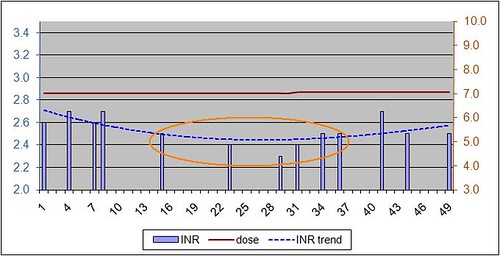This has been covered pretty well from top to bottom, but I'd just like to throw my own thoughts on the pile.
First, based on my own experience, you'd go nuts trying to maintain an INR in any specific range that narrow, unless you were willing to accept results outside the range, in which case you'd really be fooling yourself, wouldn't you? That is, whichever values outside the range were considered acceptable, would really define the range, not the stated numbers.
Second, 1.8, while it is well above the 1 value of the un-anticoagulated, is, from my reading, the very minimum value which confers a legitimate, measurable level of protection. Since the test equipment and processes, whether at home or in lab, have margins of error, I'd try to steer clear of that by a least a few 10ths.
Finally, I've kept in my range of 2.0 - 3.0 without trouble for coming up on 4 years now, since my AVR with a Carbomedics mechanical. I also take 81mg aspirin. While anti-coagulated I've been knocked on the head, hit in the face with a 2x4, fallen off a bicycle, and had my hand slammed in a car door. I've worked at two different very physical jobs, with hard knocks dealt to me every day, I've cycled, motorcycled, inline skated, jet-skied, sat for four tattoos, travelled several thousand miles at sea, flown 2 dozen plus flight segments across 22 time zones (10 forward and 12 back), got married 3 times in 3 countries (same woman, different friends and family!) and had a new baby(well, my wife did all the work, but I get half the credit!). None of it has killed me, and only the thumb in the car door and the baby forced me to cross the threshold of the hospital.
Believe me, a little anti-coagulation doesn't need to hold you back, even if it stays in the upper 2's as mine generally does.
P




